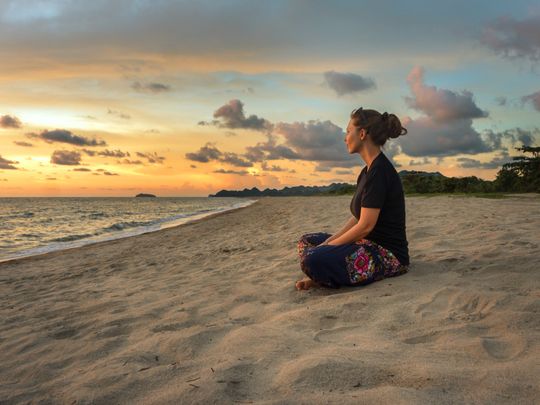
We are curious beings. We tend to ask questions. What kind of questions we ask ourselves depends on what mindset we are in and, in accordance, the answers come up.
In an inertia, or ignorant state of mind (‘tamasic’ state), our answers are imbued with tamasic vibrations; in an active or ‘go-get it’ mindset (‘rajasic’ state), our energies reflect rajasic tendencies; and in a balanced, harmonised state of ‘saatvick’ energy, the answers resonate in accordance with the saatvick questions.
Learning to self-inquire
Some minds have asked enabling questions and have accomplished high things for self. For example, Nisargadutta Maharaj, whose meditation rested on one question: “Who am I?”
Ramana Maharishi engaged in the same inquiry and offered mankind his realisation, which is: “Self-realisation is the greatest service one can render to the world.”
And that “realisation is not acquisition of anything new nor is it a new faculty. It is only removal of all camouflage.”
When you ask, the mind starts looking for answers — answers not from just this lifetime, but from memories of the other lifetimes too.
But for now, let’s look at the present life. So, what happens when you question?
Ask and open new doors
Questioning generates awareness. Asking allows you to open up to your possibilities. When you question a chronically ill person, “What will you do after you get well?”, often the answer is “I don’t know.”
Only if this disempowering answer is replaced with the question: “What if I did know?”
The mind would then start searching for constructive answers.
In day-to-day life, one can pause, get centred and self-probe to open up to a world of enabling answers.
Your answers give you ownership of your actions. They lend accountability in handling a situation.
If you seek answers from others, you run the risk of distorting them, keeping an open interpretation, based on convenience. Convenience versus responsibility, it comes to that.
Answers received from others, say a guru or a friend or a parent carries the energy of the person whose answers you accept, whereas when you ask questions to self, you find the most acceptable version of answers. After all, you understand yourself better than others do.
If, for example, you are unwell. Mum answers, “Ah, it’s just season change.” However, if you probe in all honesty: “Why am I unwell?”, you will receive revealing answers.
What kind of questions?
Potent questions are those that move you to make positive shifts. Now, this may not feel comfortable at first. For instance, if one is a habitual liar or a procrastinator or has an aggressive behaviour and self-inquires, “Why do I do it?” “Am I willing to let go of this habit?” “What can I do?” “What changes do I have to make?”, s/he may not feel comfortable, not just with the questions but with honest answers as well. But when you keeping probing, layers and layers of conditioning will peel off, and the shift will happen. Camouflage will drop. This requires practice. Welcome to the journey of self-discovery, and self-healing.
Themes of healing
Most of our challenges circle around the four core themes of: relationship, health, abundance and self-worth. There are multiple variations in each theme.
Enabling questions opens up doors of consciousness. New light comes in, meaning new realisations dawn and new possibilities open up. In order to release stuck energies, in my chakra alignment workshops, I train and encourage participants to ask enabling questions. Our seven prime energy centers hold the above themes and its variations. You too, can ask progressive questions pertaining to each chakra energy or simply pick your theme to let go of the blockages. Realisations will occur.
Here’s a tip if you find yourself in a situation. Gary Douglas, healer and founder of Access Consciousness healing technique, suggests these questions when caught up: 1. What do I do with it? 2. Can I change it? 3. If so, how can I change it?
Disclaimer: Urmila Rao is a chakra balancing meditation coach, Theta Healer and a sound therapist. All the ideas expressed herein are her own and not professional advice or medical prescription. She can be reached at: milarao2018@gmail.com









